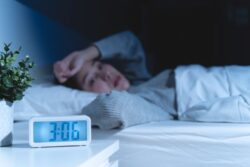Anxiety and Sleep Apnea — How Are They Connected?
May 11, 2025
Anxiety disorders and sleep apnea are both serious conditions on their own. Either one can degrade your quality of life and leave you feeling miserable. They can also have big-time consequences for your health. Even worse, they can work together to create a vicious cycle that is difficult to break out of! How exactly are anxiety and sleep apnea connected, and how can you cope? This blog post provides helpful information.
How Does Anxiety Worsen Sleep Apnea?
The relationship between anxiety and sleep apnea is complex and bidirectional. In fact, anxiety can increase the severity of sleep apnea in several ways:
- Tension and muscle stiffness: Anxiety often leads to physical tension, which can contribute to airway obstruction during sleep. This is especially true if you experience anxiety that causes muscle stiffness in your throat or upper airway.
- Insomnia and restlessness: Anxiety frequently disrupts sleep patterns, making it harder for you to achieve the deep, restorative sleep that your body requires. This can make the effects of sleep apnea more pronounced.
- Stress hormones: Anxiety may lead to elevated levels of stress hormones, such as cortisol, which can interfere with the body’s ability to maintain proper respiratory function during sleep.
How Does Sleep Apnea Affect Anxiety?
Just as anxiety can worsen sleep apnea, untreated sleep apnea can amplify feelings of anxiety. This happens for several reasons:
- Sleep deprivation: Sleep apnea causes frequent awakenings throughout the night, leading to chronic sleep deprivation. Lack of sleep is a significant trigger for anxiety, as it impairs your ability to regulate emotions and cope with stress.
- Oxygen deprivation: When your body does not receive enough oxygen during sleep, it activates a fight-or-flight response. This can increase your heart rate, elevate your blood pressure, and trigger feelings of panic or unease.
- Cognitive impairment: Sleep apnea often leads to brain fog, poor concentration, and memory problems. These cognitive issues can make you feel overwhelmed and heighten your anxiety.
How Can You Find Relief?
Relief from the effects of anxiety and sleep apnea is possible! Here are some practical steps you can take:
- Consider oral appliance therapy: Oral appliance therapy is a highly effective treatment option for many patients with sleep apnea. It involves wearing a custom-fitted device while you sleep, which helps to reposition the jaw and keep your airway open. Oral appliances are compact, portable, and non-invasive, making them a convenient alternative to other treatments.
- Manage your weight: Excess weight is a significant risk factor for sleep apnea. Losing weight through a combination of exercise and a nutritious diet can help to reduce symptoms. Regular physical activity and healthy food choices may also support emotional health.
- Try to reduce your stress: Since anxiety and stress worsen sleep apnea, incorporating relaxation techniques can be beneficial. Deep breathing exercises, mindfulness practices, and meditation may help you reduce stress levels.
- Seek professional assistance: If you struggle with anxiety disorder, consider speaking with a mental health professional. Therapy, possibly along with medication, may do much to diminish your anxiety symptoms.
Anxiety and sleep apnea are strongly linked! Do all you can to get enough rest so you can feel like yourself again.
Meet the Practice
Drs. Kenneth Mogell and Yitta Garden are sleep apnea experts. They specialize in providing oral appliance therapy to help members of our community enjoy improved health and a better quality of life. If you have been struggling to get enough rest, our team is ready to consult with you. Contact our Vero Beach office at 772-882-6800.
